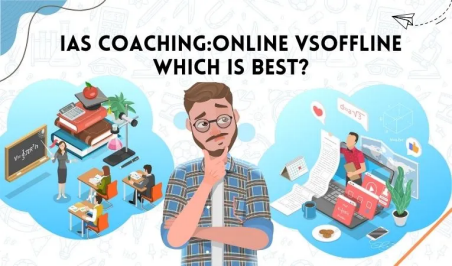Preparing for the Civil Services Examination is a demanding road that requires
commitment, planning, and appropriate direction. Choosing between online and
offline IAS coaching institutes in Kolkata is one of the most important choices an
applicant makes. Selecting the appropriate one relies on personal goals, learning
preferences, and situation, as both forms offer unique benefits and drawbacks. This
all-encompassing book will assist you in making an educated choice by examining the
main distinctions, advantages, and disadvantages of online and offline IAS coaching.
Knowing IAS Coaching Formats
IAS tutoring helps students prepare for the UPSC Civil Services Exam, among the most
challenging competitive tests in India. To simplify preparation, coaching schools
provide organised study resources, professional advice, and consistent tests.
Offline IAS Coaching is conventional classroom education at physical colleges where
students attend lectures, engage in debates, and access resources in person.
Digital platforms make up online IAS coaching; students with internet-enabled devices
access live or recorded lectures, study materials, and engage with mentors remotely.
Benefits of Offline IAS Coaching:
Organised Learning Environment
Many applicants find offline coaching schools to be regulated and scheduled, which
helps them stay focused. The classroom environment promotes regular study
practices and reduces distractions.
In-Person Interaction
Direct contact with seasoned instructors provides instant doubt clearing and tailored
attention. Group conversations and peer interactions may sometimes help to clarify
complex subjects.
Availability of Physical Resources
Some pupils prefer paper notes, books, and libraries offered by conventional coaching
centres over internet resources.
Mock Tests and Evaluations
Regular in-person examinations mimic the actual exam setting, hence enhancing time
management and exam attitude. Mentors’ immediate comments help to improve
performance.
Inspiring Environment
Being surrounded by other hopefuls with the same objectives typically fosters a
stimulating atmosphere that may enhance morale and dedication.
Drawbacks of IAS Coaching Offline
Set Time and Place
Especially in urban areas, travelling to coaching centres may be time-consuming and
frustrating. Set class times might clash with personal calendars or job obligations.
Rising Costs
Offline coaching usually costs more because of administrative, maintenance, and
infrastructure concerns.
Little Flexibility
Missing lessons because of travel or sickness might create a learning gap, as catching
up can be difficult without digital records.

Online IAS Coaching Benefits
Convenience and Flexibility
Online tutoring gives you the ability to study anywhere, anytime. Working professionals,
students from distant locations, and those with limited time will find this perfect.
Affordable
Usually, online courses are more reasonably priced since they remove infrastructure
expenses. Many websites provide free study materials and sample courses as well.
Access to a Great Variety of Resources
Digital platforms usually include video lectures, quizzes, forums, and current study
materials all in one location, hence enabling a more participatory learning experience.
Learning at your speed
Recorded lectures let students stop, rewind, and review challenging subjects,
therefore facilitating a tailored pace of study that fits their learning speed.
Incorporation of technology
Advanced learning technologies include live doubt-solving sessions, mobile
applications, and performance analytics that help measure progress quickly.

Disadvantages of Online IAS Coaching
Absence of Personal Touch
Technical Problems
For many aspirants, the lack of physical presence could diminish individualised
engagement and immediate doubt resolution.
Problems with internet access, device constraints, or platform bugs might interfere
with learning activities.
Reduced Peer Interaction
Limited chances for group study and face-to-face conversations could hinder
cooperative learning.
Which Should You Pick?
Choosing between online and offline IAS instruction relies on many variables, particular
to every applicant. Here are a few things to help you decide:
- Learning Style: Offline coaching could be ideal if you gain from direct
engagement and a disciplined schedule. Online coaching fits you better if you
value self-paced education and flexibility. - Aspirants in rural places with little access to respected coaching centres may
find online tutoring more feasible. - Online tutoring might be more inexpensive, hence lessening the financial load.
- Time Availability: Online courses are typically convenient for working people or
students with variable schedules. - Motivation and Discipline: Offline coaching could be more appropriate for
people who need an external environment to remain driven. - Combining Both: Hybrid Method
- More and more, coaching schools are providing hybrid models that mix the best
of both worlds. Hybrid coaching lets students go to actual courses when feasible
and use online tools at any time. This approach maintains individual mentoring
and peer assistance while offering flexibility.
Final thoughts
IAS tutoring both online and offline has its own merits and drawbacks. Personal tastes,
lifestyle, and particular requirements will guide the choice of the appropriate method.
Although internet coaching is more affordable, accessible, and flexible, offline
coaching gives an organisation a personal connection and inspiration. The changing
tendency towards hybrid coaching increases the possibility for applicants even more.
In the end, the greatest tutoring is the one that fits your learning style, inspires you, and
supports your consistency all along the UPSC preparation path. Whichever route you
choose, commitment and tenacity are always the prerequisites to passing the UPSC
Civil Services Examination.

